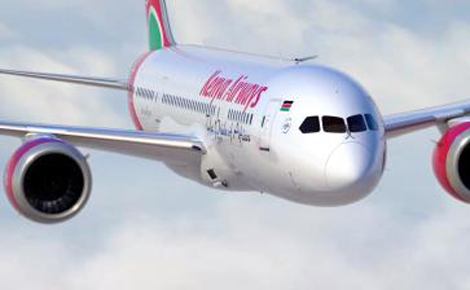 |
|
The airline can also approach the national government and seek for a judicious reduction in the amount it pays for its fuel whose bill accounts for about 35 percent of its operations cost.[PHOTO: FILE/STANDARD] |
The Sh10.4 billion net loss suffered by Kenya Airways (KQ) over the past six months may have caught Kenyans unaware, but did not come as a surprise to savvy financial analysts. Although the amount lost may have broken the previous corporate Kenya ceiling, the announcement of the continued and bigger losses by an in-coming Chief Executive Mbuvi Ngunze in a company in the middle of a debt cycle have a long history locally and internationally.
Evidence on the ground, however, suggests that KQ management’s optimism that they can regain lost ground and fly into profit soon is well grounded. But like all good things in life, the assurance of KQ’s future profits has a caveat: It must do what it does best and persuade others—particularly the national government which also happens to be its top shareholders—to do its part.
Half-year results
The list Ngunze and Chairman Evanson Mwaniki announced at the same time, made the heart-breaking half-year results public credible but will require an innovative implementation in a nuanced manner befitting a business spanning the five continents from its where draws its revenues and recruits its personnel.
To quote the Chairman’s own words “Going forward, the prospects for our business are positive, driven by deployment of a new efficient fleet, opening of Terminal 1A at Jomo Kenyatta International Airport dedicated to KQ’s new lounges at the hub and redesign of the airport infrastructure.
The greatest challenge facing KQ management, according to its own admission, is increasing the revenues generation faster than the growth of its operating costs. But the jury is still out on whether the way the company has been around the issue is either the right one or the most cost effective.
The issue of the on-going retrenchment, for example, suggests that the company views it as a way of cost savings. The irony is that the same management also admits the company has failed to fill seats on some of its routes because its staff suffers from low morale and lack of training.
It is unfortunate the company did not spell out just how it would deal with this challenge because this could be the game changer in the entire recovery plan. The board may be well advised to follow up its decision to hire a financial advisor to help it deal with its capital structure with a change-manager who will help it to come up with a plan to motivate its staff to increase their productivity.
The board members must surely be aware that the phenomenal success of the once iconic Cathy Pacific and the current national airlines from the Middle East is largely driven by the superior service offered to all classes of customers right from the ticketing office to the cabins. It should also be equally obvious that this level of service can only be offered by a staff that is truly well motivated. The less obvious fact is that motivation does not depend on the amount of money paid out in salaries and bonuses contrary to the popular belief. According to a survey first published in Forbes Magazine and partly reprinted in the Standard on Friday, earlier this month in the Jobs+Careers section, the question of how to get employees to give 110 per cent was asked in a survey and the results were startling.
The results clearly showed that employees need to feel part of a winning company. They need to know that they are valued and are encouraged to do their very best by being shown just how valuable their contribution is to overall success of the company irrespective of the position any of them holds.
Although senior management has to do the heavy lifting, of course, every staff member has the role of supporting his or her colleagues in reinforcing the positive feelings they all share about working for the company. This is why many analysts now agree staff retrenchment is a crude weapon used by companies whose human resource department are sleeping on the job.
These analysts often liken the exercise to a hospital calling in a butcher with a cleaver to do surgery on the patient requiring a trained surgeon using a surgeon’s knife. The results for such a patient would be no different from the outcome witnessed in companies fond of endless staff retrenchments. Kenya Airways has to find better ways of getting more from its existing staff.
The board’s decision to increase compensation for its directors and key management by 10 per cent at the very time it is retrenching staff is one that obviously, did not fly well among the employees. Sessions can heal the breach in trust experienced by such staff—in the short-term.
Greater responsibility
The sales department deserves special treatment even as it is tasked with the greater responsibility of luring more passengers to make the national carrier their first choice. The first requirement would be for the sales team to analyse the reasons behind the attraction of the airlines coming from the Middle East and beat them at their own game.
Stay informed. Subscribe to our newsletter
In business, patriotism is not enough although it has to be admitted that even in politics it is often a camouflage for rascals. After demonstrating the company is serious about putting its house in order, the airline can approach the national government and seek for a judicious reduction in the amount it pays for its fuel whose bill accounts for about 35 percent of its operations cost. This should not be a too difficult case to make considering the multiplier effect of every passenger the airline flies into the country.
Obviously, the Government will find it easier to lend its support in this area once the country begins producing its own oil. But in the meantime, it has to find a way of helping “the pride of Africa” which has built an enviable reputation around the continent despite its competitors enjoying state subsidies. [email protected]
 The Standard Group Plc is a
multi-media organization with investments in media platforms spanning newspaper
print operations, television, radio broadcasting, digital and online services. The
Standard Group is recognized as a leading multi-media house in Kenya with a key
influence in matters of national and international interest.
The Standard Group Plc is a
multi-media organization with investments in media platforms spanning newspaper
print operations, television, radio broadcasting, digital and online services. The
Standard Group is recognized as a leading multi-media house in Kenya with a key
influence in matters of national and international interest.
 The Standard Group Plc is a
multi-media organization with investments in media platforms spanning newspaper
print operations, television, radio broadcasting, digital and online services. The
Standard Group is recognized as a leading multi-media house in Kenya with a key
influence in matters of national and international interest.
The Standard Group Plc is a
multi-media organization with investments in media platforms spanning newspaper
print operations, television, radio broadcasting, digital and online services. The
Standard Group is recognized as a leading multi-media house in Kenya with a key
influence in matters of national and international interest.






